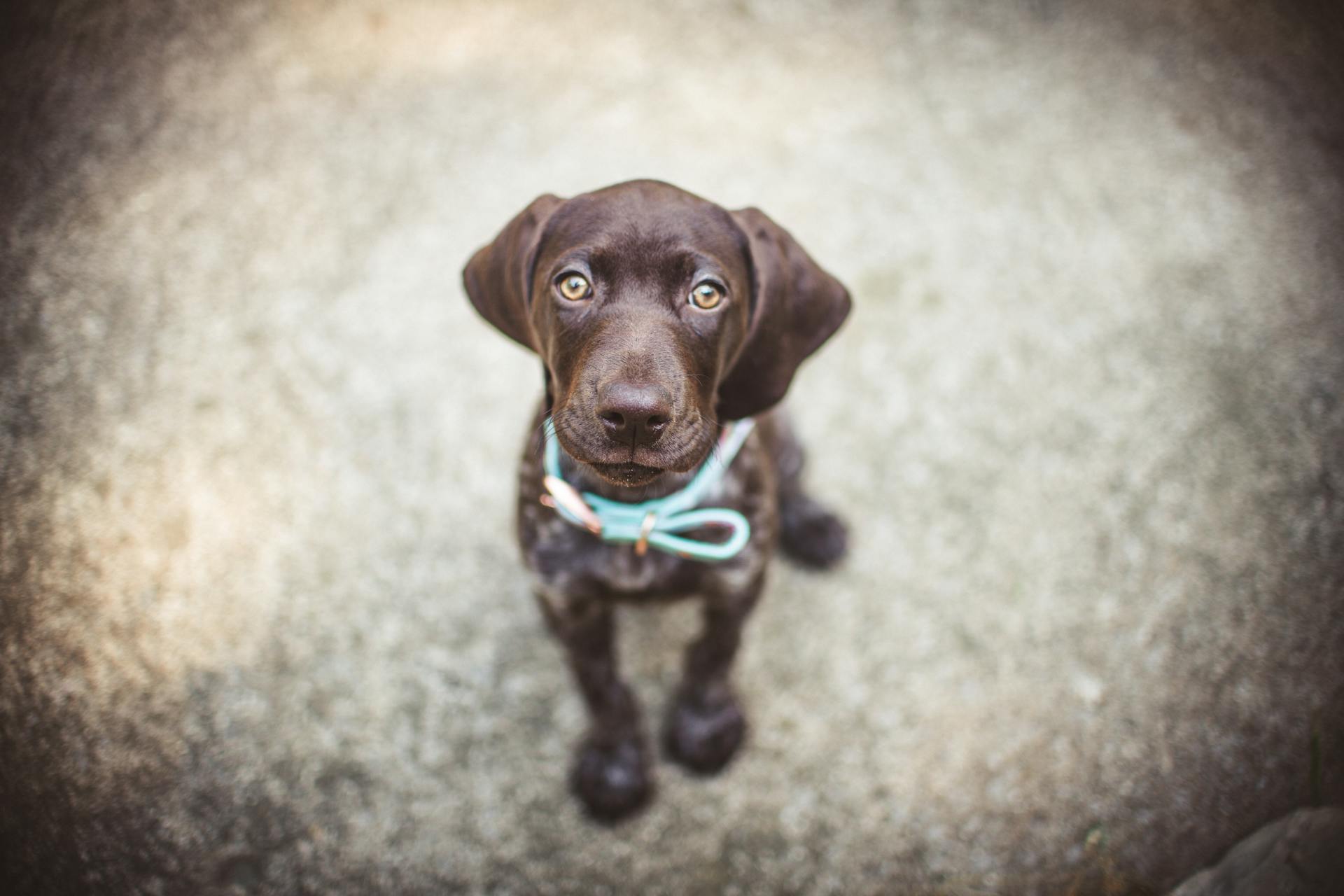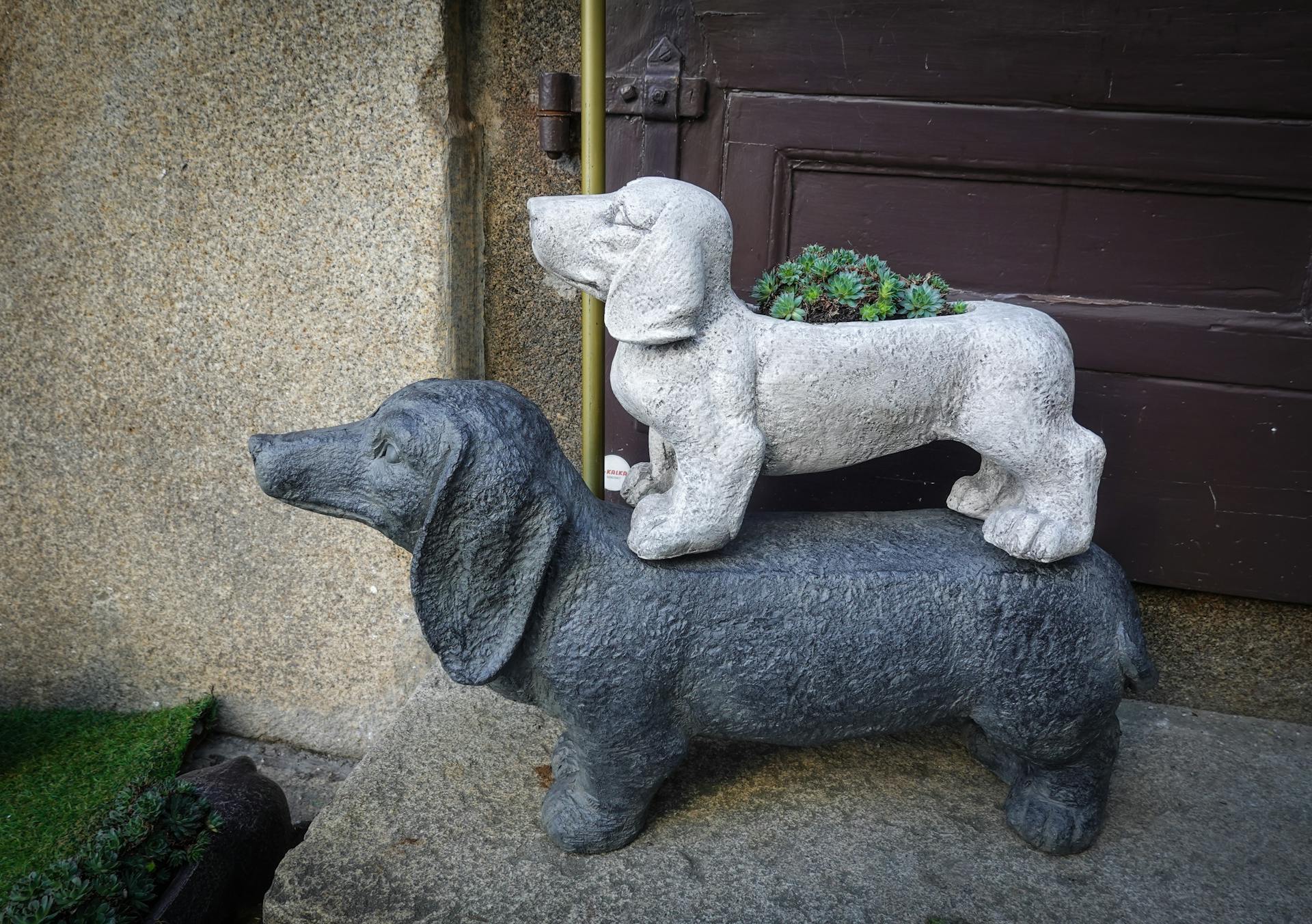
If you're considering bringing a Dachshund or Mini Dachshund into your family, it's essential to understand the differences between these two beloved breeds.
Dachshunds can grow up to 11 inches in height, making them a relatively small dog, but they can weigh between 16 and 32 pounds.
Mini Dachshunds, on the other hand, are a smaller version of the standard Dachshund, weighing between 11 and 16 pounds and standing about 6-9 inches tall.
Their compact size makes them a great choice for apartment living or for families with smaller spaces.
Care and Health
Miniature dachshunds don't require an excessive amount of exercise, but they still need mental stimulation and physical activity each day.
Their grooming is fairly straightforward, depending on their coat type, but it's essential to keep an eye on their ear health, as their ears are prone to holding moisture and causing ear infections.
To prevent back problems, it's crucial to monitor your miniature dachshund's weight, as obesity can exacerbate the issue. A dachshund is considered obese if they weigh more than 15% of what the dog should weigh.
Regular check-ups with your vet are vital, especially at 6-month intervals, to catch any minor conditions before they escalate into something worse.
Some common health issues to be aware of include:
- Dental issues and gum disease
- Infections
- Canine obesity
- Allergies (including fleas, food, and pollen)
- Eye problems
- Intervertebral Disc Disease (a condition that affects the dog’s back)
- Hip dysplasia
To keep your miniature dachshund healthy, it's essential to provide a well-balanced diet and prevent them from gaining weight. Jumping is also not a favorable activity for them, as it can put strain on their backs.
Size and Weight
A Dachshund's size and weight can vary depending on whether it's a standard or miniature version. Standard Dachshunds can weigh up to 32 pounds.
Miniature Dachshunds, on the other hand, are significantly smaller and should weigh less than 11 pounds. They can even be as small as 4.5 kilograms, which is equivalent to 10 pounds.
The American Kennel Club Official Dachshund Breed Standards specify that adult standard Dachshunds should weigh between 16 and 32 pounds. Miniature Dachshunds, however, should weigh less than 11 pounds.
Both standard and miniature Dachshunds should appear low to the ground and have well-defined muscles. Their height can also vary, with standard Dachshunds standing between eight to nine inches tall and miniature Dachshunds standing around five to six inches tall.
Curious to learn more? Check out: Mini Poodle vs Standard Poodle
Diet and Nutrition
Diet and nutrition is a crucial aspect of caring for your dachshund, regardless of whether you have a standard or miniature dachshund. Always have fresh water accessible for your dachshund.
Feeding your dachshund a nutritionally balanced canine diet is essential, and it's best to stick to two measured meals per day. Discuss the type of diet and amount with your vet to ensure you're making the right choice for your dog.
Dachshunds are prone to overeating, so it's essential to monitor their appetite and not overindulge them in doggy sweets and treats. Both standard and miniature dachshunds need to be mindful of their food intake to avoid obesity.
Miniature dachshunds will need less food than their full-size counterparts, but it's still crucial to choose the best dry dog food for small dogs. Sticking to a healthy diet will help prevent your dachshund from becoming overweight, which can put strain on their long back and lead to disc problems.
Don't let your dachshund overindulge in the worst dog treat brands, as they can contribute to weight gain and obesity.
A unique perspective: Mini Dachshund Puppy Food
Training and Environment
Training a dachshund requires patience and consistency, especially from puppyhood. They can be quite stubborn, but with time and effort, you can establish yourself as the pack leader.
Socialising your dachshund from a young age is crucial, as they usually get on well with other pets if introduced properly. This will help prevent potential conflicts and make them more adaptable to new environments.
If you live in a house with a yard, be prepared for your dachshund to dig holes, a trait inherited from their origins in tunnelling for rabbits and foxes.
Temperament and Home Environment
Miniature dachshunds are known for their curious nature and sense of humour, making them great family pets.
They love human interaction and like to be doted on, which means they thrive in households where they receive plenty of attention.
Dachshunds usually get on well with other pets if they are introduced to them from a young age.
However, their loud bark can be a challenge, so it's essential to consider this when deciding whether a miniature dachshund is right for you.
Their origins in tunnelling for rabbits and foxes can lead to them digging holes, so a securely fenced yard is a must.
A miniature dachshund's loyalty to their family is unmatched, making them a wonderful companion for those who are willing to provide the necessary attention and care.
You might enjoy: Why Are Dachshunds so Clingy
Training
Training is a crucial aspect of a Dachshund's life, and it's best to start from puppyhood. They need to learn who's in charge, and that's you.
Establishing yourself as the pack leader is essential, as Dachshunds can be quite stubborn. This will help them respect you and look for your approval in disputes or conflicts.
A little bit of trouble and mischief is bound to happen, but with consistent training, you can prevent most issues.
Cost and Ownership
Owning a dachshund or a miniature dachshund requires careful consideration of the costs involved.
The lifetime cost of owning a miniature dachshund can add up quickly, with expenses including dachshund food and diet, which can range from $500 to $700 per year.
Veterinary care is another significant cost, with annual check-ups and potential health issues adding up over time.
Pet insurance can help mitigate some of these costs, but it's essential to factor it into your overall budget.
You'll also need to consider kennels or dog sitters when you're away from home, which can cost anywhere from $20 to $50 per day.
Regular canine grooming costs, such as nail trimming and bathing, can range from $30 to $90 per session.
Here's a breakdown of the estimated annual costs of owning a miniature dachshund:
Overall, owning a miniature dachshund requires a significant financial commitment, but with proper planning and budgeting, it can be a rewarding experience for you and your new furry friend.
FAQs
Dachshunds and Miniature Dachshunds are both small breeds, but the main difference is in size. Standard Dachshunds typically weigh between 16-32 pounds.
You can expect a Miniature Dachshund to weigh around 11 pounds or less, which is significantly smaller than the standard Dachshund. They also stand about 5-6 inches tall at the shoulder.
The primary difference between a Dachshund and a Miniature Dachshund is their size, with Miniature Dachshunds being smaller than standard Dachshunds. Temperament and other characteristics are generally similar.
Breed preferences are subjective, and what some people may perceive as challenging traits in Dachshunds, others may find endearing. Like any breed, Dachshunds benefit from proper training, socialization, and care.
A Miniature Dachshund's ideal weight is around 11 pounds or less, but individual dogs may vary. It's essential to monitor their weight to ensure they maintain a healthy size.
Miniature Dachshunds usually weigh around 11 pounds or less and are smaller than the standard Dachshund.
You might like: Mini Dachshund Ideal Weight
Frequently Asked Questions
What are the pros and cons of Miniature Dachshunds?
Miniature Dachshunds have loving, loyal personalities and adorable appearances, but they may be prone to back problems due to their unique body shape
How do I know if my Dachshund is a mini?
To determine if your Dachshund is a miniature, check its height, as miniatures are typically 5-6 inches tall. If your Dachshund is under 6 inches, it's likely a miniature, but weight and other factors can also influence its classification.
What are the three sizes of Dachshunds?
Dachshunds come in three sizes: standard, miniature, and kaninchen (also known as "rabbit"). The standard and miniature sizes are widely recognized, but the kaninchen size is not recognized in the US and UK.
Do mini dachshunds live longer than standard dachshunds?
Mini dachshunds and standard dachshunds have surprisingly similar lifespans, with miniatures living an average of only 0.1 years longer than standards. However, the age of death histograms reveal a more complex picture, worth exploring further.
What makes a mini dachshund mini?
A Miniature Dachshund's small size is defined by its height of 5-7 inches and weight of 8-11 pounds, making them a compact and portable companion. This unique size allows for easy handling and transportation, making them a great choice for many dog owners.
Sources
- https://www.thesprucepets.com/mini-dachshund-5197884
- https://www.myfamilyvets.co.uk/miniature-dachshund-breed-guide
- https://www.pawlicy.com/blog/dachshund-growth-and-weight-chart/
- https://www.thekennelclub.org.uk/breed-standards/hound/dachshund-miniature-smooth-haired/
- https://www.alphapaw.com/dog-breeds/dachshund-vs-miniature-dachshund/
Featured Images: pexels.com


